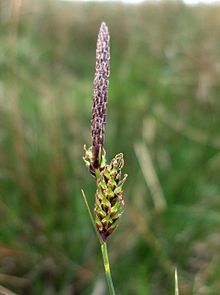Carex sect. Spirostachyae
Warning: Display title "<i>Carex <span style="font-style:normal;">sect.</span> Spirostachyae</i>" overrides earlier display title "<i>Carex</i> sect. <i>Spirostachyae</i>" (help).{| class="infobox biota" style="text-align: left; width: 200px; font-size: 100%"
|-
! colspan=2 style="color:inherit; text-align: center; background-color: rgb(180,250,180)" | Carex sect. Spirostachyae
|-
| colspan=2 style="text-align: center" |  |-
| colspan=2 style="text-align: center; font-size: 88%" | Carex binervis
|-
|-
| colspan=2 style="text-align: center; font-size: 88%" | Carex binervis
|-
|- style="color:inherit; text-align: center; background-color: rgb(180,250,180)"
|-
|-
! colspan=2 style="color:inherit; min-width:15em; text-align: center; background-color: rgb(180,250,180)" | Scientific classification ![]() |-
|Kingdom:
|Plantae
|-
|Clade:
|Tracheophytes
|-
|Clade:
|Angiosperms
|-
|Clade:
|Monocots
|-
|Clade:
|Commelinids
|-
|Order:
|Poales
|-
|Family:
|Cyperaceae
|-
|Genus:
|Carex
|-
|Subgenus:
|Carex subg. Carex
|-
|Section:
|Carex sect. Spirostachyae
|-
|Kingdom:
|Plantae
|-
|Clade:
|Tracheophytes
|-
|Clade:
|Angiosperms
|-
|Clade:
|Monocots
|-
|Clade:
|Commelinids
|-
|Order:
|Poales
|-
|Family:
|Cyperaceae
|-
|Genus:
|Carex
|-
|Subgenus:
|Carex subg. Carex
|-
|Section:
|Carex sect. Spirostachyae
(Drejer) L. H. Bailey in J. M. Coulter
|-
|-
|-
|- style="color:inherit; text-align: center; background-color: rgb(180,250,180)"
|-
|-
|-
|-
|-
|-
|-
|- ! colspan=2 style="color:inherit; text-align: center; background-color: rgb(180,250,180)" | Subsections [1] |- | colspan=2 style="text-align: left" |
- C. subsect. Elatae
- C. subsect. Spirostachyae
|-
|-
|-
|}
Carex sect. Spirostachyae is a section of the genus Carex, containing 38 species of sedge. Species in Carex sect. Spirostachyae share a suite of features, including the short internodes of the primary rhizomes, the presence of an antiligule, the leaf-like, sheathing bract at the base of the inflorescence, the presence of three stigmas in female flowers, and the shape of the seeds.[1]
The section is composed of two subsections, with differing edaphic preferences; subsection Elatae comprises species that lives on acidic soils, while those in subsection Spirostachyae live on basic or ultramafic soils.[1] The two sections also differ morphologically, with species in subsection Elatae having wider leaves, thicker stems and larger spikes, the lowest of which may hang downwards.[1]
The centre of diversity of the group is in Europe and adjacent parts of Africa and Asia; a few species occur in Australia, Africa, South America and on oceanic islands.[1] The three species present in North America are introductions.[2]
- Subsection Elatae (Kük.) Luceño & M. Escudero
- Carex aethiopica Schkuhr – South Africa
- Carex binervis Sm. – western Europe
- Carex borbonica Lam. – Mascarene Islands
- Carex boryana Schkuhr – Mascarene Islands
- Carex camposii Boiss. & Reut. – southern Spain
- Carex catharinensis Boeck. – southeastern Brazil
- Carex clavata Thunb. – South Africa
- Carex cyrtosaccus C. B. Clarke – Tanzania, Malawi
- Carex elgonensis Nelmes – Mount Elgon
- Carex fischeri K. Schum. – central Africa
- Carex fissirostris Ball – Atlas Mountains, Morocco
- Carex fuscula d'Urv. – Chile, Argentina
- Carex gunniana Boot. – southeastern Australia
- Carex helodes Link – southern Spain and Portugal, northern Morocco
- Carex hochstetteriana J. Gay ex Seub. – Azores
- Carex laevigata Sm. – western Europe, Morocco
- Carex petitiana A. Rich. – central Africa
- Carex lowei Bech. – Madeira
- Carex mairii Coss. & Germ. – France, Spain, northern Morocco
- Carex mannii E. A. Bruce – central Africa
- Carex mildbraediana Kük. – Rwanda, Burundi, Kenya
- Carex modesti M.Escudero, Martín-Bravo & Jim.Mejías – Tanzania[3]
- Carex paulo-vargasii Luceño & Marín – Morocco
- Carex perraudieriana J. Gay – Canary Islands
- Carex punctata Gaud. – Europe, Morocco, western Asia
- Carex simensis Hochst. ex A. Rich. – central Africa
- Carex thouarsii Carmich. – Tristan da Cunha
- Carex vallis-rosetto K. Schum. – Kenya, Tanzania
- Subsection Spirostachyae
- Carex blakei Nelmes – southeastern Australia
- Carex burchelliana Boeck. – South Africa
- Carex diluta M. Bieb. – central and western Asia
- Carex distans L. – Europe, North Africa, central and western Asia
- Carex ecklonii Nees – South Africa
- Carex extensa Good. – Europe and Mediterranean Basin
- Carex idaea Greuter et al. – Crete
- Carex lainzii Luceño, E. Rico & T. Romero – central Spain
- Carex tasmanica Kük. – Tasmania
- Carex troodi Turril – Cyprus
- Carex vixdentata (Kük.) G. A. Wheeler – South America
References
- ^ a b c d e Marcial Escudero; Modesto Luceño (2009). "Systematics and evolution of Carex sects. Spirostachyae and Elatae (Cyperaceae)". Plant Systematics and Evolution. 279 (1–4): 163–189. doi:10.1007/s00606-009-0156-x.
- ^ Peter W. Ball; A. A. Reznicek; David F. Murray (2002). "Carex Linnaeus sect. Spirostachyae (Drejer) L. H. Bailey in J. M. Coulter, Man. Bot. Rocky Mt. 381. 1885". Magnoliophyta: Commelinidae (in part): Cyperaceae. Flora of North America North of Mexico. Vol. 23. Oxford University Press. pp. 521–523. ISBN 978-0-19-515207-4.
- ^ S. Martín-Bravo; M. Escudero; P. Jiménez-Mejías (2012). "Carex modesti (Cyperaceae), a new species from southern Tanzania". Blumea. 57 (2): 143–146. doi:10.3767/000651912X657576.
Further reading
- Marcial Escudero; Virginia Valcárel; Pablo Vargas; Modesto Luceño (2008). "Evolution in Carex L. sect. Spirostachyae (Cyperaceae): a molecular and cytogenetic approach". Organisms Diversity & Evolution. 7 (4): 271–291. doi:10.1016/j.ode.2006.08.006.
